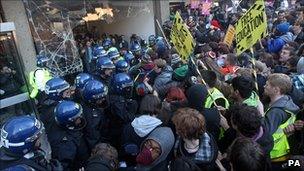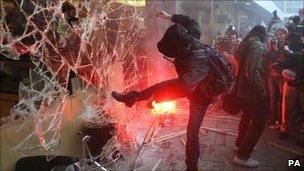Met Police launch inquiry into student protest
- Published

Sir Paul said the force had failed to anticipate the level of violence
The Met Police is launching an inquiry into how it prepared for Wednesday's student march over university tuition fees, which ended in violent clashes.
Thousands marched peacefully in London over plans to increase fees in England.
But outside Tory party headquarters in Millbank, a minority smashed windows, lit fires and threw missiles at police.
Met chief Sir Paul Stephenson said the violence, which led to 35 arrests and 14 people being injured, was unexpected and "an embarrassment to London".
The police inquiry was welcomed by Prime Minister David Cameron, who said he watched live the pictures of the Conservative party headquarters being attacked from South Korea, where he is attending a G20 summit.
In an interview with the BBC's Nick Robinson, Mr Cameron said: "I was worried for the safety of people in the building because I know people who work in there, not just the Conservative party, but other offices as well, and so I was on the telephone.
Commenting on what he saw, Mr Cameron said: "Yes, people can protest. But violence. Not acceptable."
The violence was also condemned by student leaders and the Mayor of London, Boris Johnson.
Officers hurt
The day began with a largely peaceful march after hundreds of coachloads of students and lecturers from England and Wales converged in the capital.
But once the march reached Conservative HQ, some demonstrators used tools to smash through windows.
Crowds then surged forward and stormed the building. Some fled to the roof from where they threw a fire extinguisher and liquids, it was reported.
The BBC's Mike Sergeant, who was at the scene, said one female police officer was injured by the missiles.
Six fellow police officers and seven others were also injured in the clashes, according to Scotland Yard. No-one is thought to be seriously hurt.
The latest police figures showed 35 arrests were made.
By 1700 GMT, the police had largely taken control of the building, but a stand-off between about two dozen demonstrators and the police continued late into the evening.
Protesters were contained on the road and were eventually released by police. Their photographs were taken as they left to help identify key troublemakers.
Essex University student Leila Khaled, 22, was among those held in the police cordon. She said demonstrators, who were not there to cause trouble, were left "freezing" and "desperate" as they waited to be let out.
Met Commissioner Sir Paul said the force should have anticipated the level of violence "better".
"It's not acceptable. It's an embarrassment for London and for us," he said.

Windows were smashed in before protesters stormed the building
But former Flying Squad commander John O'Connor accused the Met of having "no tactics and nowhere near enough people" at the scene.
"It's an absolute disgrace," he said.
"I don't understand how anybody could have sat there planning that event and not taken the contingency plan into consideration that this is likely to erupt into violence."
Police had been "naive" to talk to student planners without taking into account the threat from anarchist groups aiming to infiltrate the protest and "gee up" the peaceful protesters into supporting them, he added.
Mr Johnson said he was appalled that "a small minority had abused their right to protest".
'Intolerable'
"This is intolerable and all those involved will be pursued and they will face the full force of the law."
Conservative Party chairman Baroness Warsi, who was inside the building during the protest, said police had responded "in the circumstances that they felt best".
"People had a legitimate right to protest on issues that they felt very strongly [about], and it is a shame that a small minority of those protesters ruined it for the rest of them," she said.
The demonstration turned violent at Conservative Party headquarters in Millbank
Demonstrators were also cleared from outside the Liberal Democrat headquarters, where a car window was smashed.
National Union of Students (NUS) president Aaron Porter said the violence was "despicable" and not part of the plan.
"This action was by others who have come out and used this opportunity to hijack a peaceful protest," he said.
The NUS is threatening to try to unseat Liberal Democrat MPs who go back on pre-election pledges they made to oppose any rise in tuition fees.
Higher education funding is being cut by 40% - with teaching grants being all but wiped out except for science and maths.
The government expects the costs of teaching other courses to be funded by tuition fees from 2012.
The plan is for a lower cap at £6,000, with universities able to charge up to £9,000 - triple the current cap - in "exceptional circumstances". Ministers insist their plans offer a "fair deal for students".
'U-turns'
Earlier on Wednesday, during prime minister's questions in the Commons, Deputy Prime Minister Nick Clegg had a fiery exchange with Labour's Harriet Harman over fees.
He was accused of hypocrisy, because the Liberal Democrats opposed tuition fees in the election run-up.
But he said Labour had made U-turns itself over fees, which it brought in in 1997, and said the party had no clear alternative policy.
Meanwhile, research by the Higher Education Policy Institute suggests all universities will charge tuition fees of £9,000 to avoid being labelled as a "low quality" institution.
It says: "Those institutions that are over-subscribed will charge £9,000 without hesitation.
"Those that have struggled to recruit students will initially be more cautious, but, within a few years, we believe that almost all universities will charge the maximum fee."
- Published10 November 2010
- Published10 November 2010